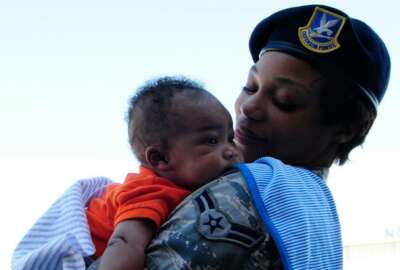DoD needs comprehensive approach to child care
Top Air Force official says that DoD needs to decide whether child care is a must-have or a 'nice to have' for the military.
The Air Force has made significant progress in ensuring airmen and guardians have access to affordable child care across the force. But the Defense Department needs to figure out whether child care is a “requirement or a nice to have,” the service’s top enlisted official said Thursday.
Speaking at an event hosted by the Air and Space Forces Association, Chief Master Sergeant of the Air Force JoAnne Bass said that DoD needs to have a more comprehensive approach to meeting military-specific childcare needs, which will, in turn, improve retention and recruitment for the military.
“We have to think about what that model might look like,” Bass said.
“Our installation commanders … across the board are doing phenomenal things to make sure that they’re addressing it at the local level. Our childcare capacity has increased over the last year, and I couldn’t be more proud. We have less people on waiting lists and more [family child care] providers, which is really helpful, especially for airmen doing 24/7. But we’ve got to, I think, take a look as a department on how do we increase the capacity even more so that our service members can focus on the mission and know that their children will be taken care of,” she continued.
Bass is meeting with lawmakers later this month to discuss quality-of-life issues. The main topics she plans to flag for them include pay and compensation, healthcare and child care.
In their 2024 budget proposals, the military services requested significant increases in their childcare spending. The Air Force, however, proposed the largest increase among the branches, with a 19.4% rise over what Congress approved for 2023, totaling $466 million. The Pentagon’s total budget request for fiscal 2024 for child development programs was $1.79 billion, a 10.3% increase from 2023.
The defense policy bill, passed into law last month, requires an increase in appropriated funds to account for 115% of childcare fee receipts. It means that the Pentagon will be required to allocate funds for childcare programs that exceed the revenue generated through childcare fees.
Congressional push for transparency
The defense bill also requires the Defense secretary to brief Congress throughout the year on progress made in implementing universal pre-kindergarten programs in schools operated by DoD.
During the first briefing, the Pentagon will need to provide a report laying out locations within the department’s jurisdiction where universal pre-kindergarten programs and child development centers are co-located. Congress also wants to know the approximate number of children transitioning from child development centers to pre-kindergarten programs as a result of new program offerings.
As for the subsequent briefings, Congress expects an overview of the overall costs of funding universal pre-kindergarten programs in schools operated by the Department of Defense Education Activity (DoDEA). Lawmakers also want the Pentagon to evaluate the availability of teachers for pre-kindergarten programs and assess whether airmen and guardians prefer to enroll their children in pre-kindergarten programs rather than continuing care in child development centers.
The Pentagon will also have to provide information on military installations with the longest waiting lists for childcare services at military child development centers and the number of classrooms shut down due to insufficient staffing and maintenance-related issues.
Understanding the extent of childcare provider shortages is nearly impossible since DoD doesn’t provide regular data on this topic. In addition, there is no information on how long waitlists at child development centers are, causing frustration among military parents.
In 2021, Federal News Network obtained a report revealing that just the Air Force had 5,116 children with an “unmet need” for care and that the average waiting time was 151 days.
Fee assistance
Starting this week, lower-income military service members will pay lower fees at DoD child development facilities.
The Defense Department adjusted its childcare fees to reduce the financial burden for service members and lower-income families. The changes are part of a DoD-wide fee structure change effective Jan. 1, 2024.
The Pentagon announced a policy change last year, consolidating income-based fee categories from 14 to 11. This change will streamline the fee structure, making childcare rates more equitable. This development builds on the previous year’s expansion of home-based child care, a measure designed to ease burden on the services’ child development centers.
Under the new calculations, there is also an increase of $100 per child in the monthly childcare fee assistance provider rate cap for both community-based providers and military-certified family childcare providers. Servicemembers can contribute up to $5,000 per household for eligible dependent care.
“We recognize the importance of providing military families and DoD civilians with access to quality and affordable childcare, and we’re committed to addressing the increased demand and challenges for this critical issue, which directly impacts the readiness of the Total Force.” Grier Martin, assistant secretary of Defense for Manpower and Reserve Affairs, said in a press release.
Addressing shortage of childcare providers
Alex Wagner, the assistant secretary of the Air Force for manpower and reserve affairs, said that higher pay alone will not solve the shortage of childcare providers. Officials decided that offering free or discounted care to childcare providers for childcare employees own children would address the issues.
“We’re not at 80% staffing in every location, but I’m looking at the trends every single month, and we’re making progress. Our CDCs are the gold standard. Everyone wants in, but not everyone is available to meet the CDCs during their opening times. So we are incentivizing a whole host of other options, including family childcare homes, including fee assistance, and we’re focused on that to fill those gaps,” Wagner said at the Air Force Association’s annual conference in National Harbor, Md., in October.
For fiscal 2024, the House and Senate Armed Services Committees proposed an amendment to provide discounted child care for DoD child care provider, but the legislative provision never got adopted. Congress noted that the Defense Secretary already has the authority to set discounted rates for DoD childcare employees.
Copyright © 2024 Federal News Network. All rights reserved. This website is not intended for users located within the European Economic Area.







